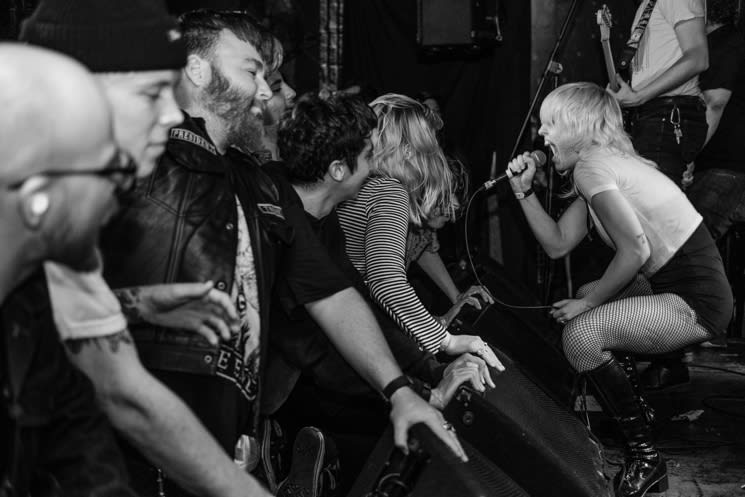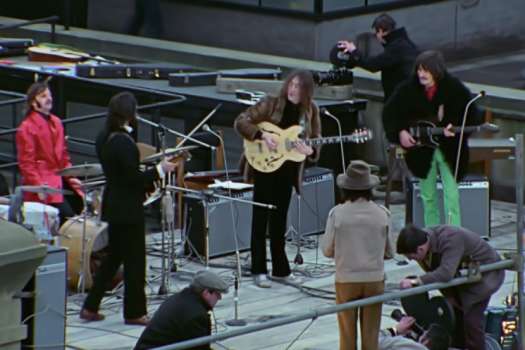Back in April, reports began trickling out that the coronavirus pandemic might prevent concerts from returning in full force until 2021 — a number that seemed almost unthinkable at the time, but now appears to be inevitable. Since then, even as parts of the country have begun reopening, the future is looking as uncertain as ever for the live music industry. While Zoom livestreams might mean good news for bands and drive-in shows could allow for some outdoor gigs, indie venues are facing the very real possibility of being wiped out almost completely.
Enter the Canadian Independent Venue Coalition (CIVC), a loosely organized alliance of Canadian concert spaces, united in the common cause of raising awareness about the precarious position of venues (and their employees).
"We are approaching 100 days of being closed and it has been a draining, stressful experience," says Shaun Bowring, owner of Toronto venues the Garrison and the Baby G. "Most people who work at the Garrison and the Baby G are also working, recording, touring musicians, so they have been hit twice. We are a fairly tight social bunch, so that has been hard as well, not being around our extended family."
The CIVC began as a spinoff of the Canadian Live Music Association's weekly Zoom calls. They were spurred into action in May in anticipation of the government announcing Phase 2 of the Emergency Support Fund for Cultural, Heritage and Sport Organizations. According to CIVC's figures — alongside those of the U.S.-based National Independent Venue Association — more than 90 percent of independent venues will permanently close within the next six months unless the government comes through with support.
To rally the government for help, representatives of a few dozen venues from across the country formed an informal committee with the goal of spreading awareness of the plight of their industry.
Financially, it's a terrifying position, but as Andrea Kotylak and Tyson Boyd — owners of Edmonton's Starlite Room and ConcertWorks — explain, running a venue was always a fairly precarious prospect.
"I think the original fears were for our staff, if they will be able to make rent and eat," Kotylak says. "Now, with nearly all our staff laid off and collecting either CERB or unemployment insurance, the fears have shifted to the contract workers, musicians and live music culture, which were sorta where the fears were prior to the pandemic."
Even more than any one venue, this is what Canada's entertainment industry truly stands to lose due to coronavirus lockdowns: its tradition of local live music, which thrives in underground scenes across the country, and occasionally propels an artist like Arcade Fire or Grimes to international stardom. The Canadian music community is an ecosystem, made up of artists, venues, labels and more: remove any one part, and the whole thing is in danger of collapsing.
"Small venues act as proving grounds for artists," explains Bowring. "Without those venues, that system collapses."
The venue owners we spoke to all agree: social distancing measures will ruin the live music experience. Venues won't be able to meet the bottom line if they're forced to operate below capacity, and it's impossible to capture the cathartic energy of a great concert if everyone is standing two metres apart, carefully keeping an eye on their surroundings.
"There's no losing yourself in the moment when you're expected to be acutely aware of your movements and interactions with an audience," Boyd says.
Social distancing measures might even have an adverse affect on the concert industry, creating negative associations that might linger long after the virus.
"The concertgoer needs to feel confident, safe, and have a positive experience attending a show," asserts Bowring. "Presenting a show with 50 people wearing masks in a 300 capacity room standing two metres apart could potentially have long-term negative effects."
So what can fans do to ensure that venues all across the country are able to survive? The Canadian Independent Venue Coalition is focusing its efforts on lobbying politicians by encouraging fans to email their local MPs and municipal leaders to emphasize the important of local independent venues, both financially and culturally. Given that politicians typically aren't involved in local DIY scenes — yes, Joe Keithley is an exception — they might not know how much is at stake.
Details on who to write to can be found on CIVC's website. Fans can also support local venues by donating, although widespread and long-lasting change will need to take place on a government level.
Ultimately, Canada's live music community will find a way to survive the COVID-19 for one simple reason: because it has to. So long as there are determined artists and devoted fans across Canada, the scene will continue to exist in one form or another — and it's the CIVC's mission to ensure that it's post-pandemic future is as strong as its past.
"Live music in Canada will prevail," states Kotylak. "We are a passionate, ingenuitive group of people. The Canadian music community will be forever changed, but we will find a way."
Enter the Canadian Independent Venue Coalition (CIVC), a loosely organized alliance of Canadian concert spaces, united in the common cause of raising awareness about the precarious position of venues (and their employees).
"We are approaching 100 days of being closed and it has been a draining, stressful experience," says Shaun Bowring, owner of Toronto venues the Garrison and the Baby G. "Most people who work at the Garrison and the Baby G are also working, recording, touring musicians, so they have been hit twice. We are a fairly tight social bunch, so that has been hard as well, not being around our extended family."
The CIVC began as a spinoff of the Canadian Live Music Association's weekly Zoom calls. They were spurred into action in May in anticipation of the government announcing Phase 2 of the Emergency Support Fund for Cultural, Heritage and Sport Organizations. According to CIVC's figures — alongside those of the U.S.-based National Independent Venue Association — more than 90 percent of independent venues will permanently close within the next six months unless the government comes through with support.
To rally the government for help, representatives of a few dozen venues from across the country formed an informal committee with the goal of spreading awareness of the plight of their industry.
Financially, it's a terrifying position, but as Andrea Kotylak and Tyson Boyd — owners of Edmonton's Starlite Room and ConcertWorks — explain, running a venue was always a fairly precarious prospect.
"I think the original fears were for our staff, if they will be able to make rent and eat," Kotylak says. "Now, with nearly all our staff laid off and collecting either CERB or unemployment insurance, the fears have shifted to the contract workers, musicians and live music culture, which were sorta where the fears were prior to the pandemic."
Even more than any one venue, this is what Canada's entertainment industry truly stands to lose due to coronavirus lockdowns: its tradition of local live music, which thrives in underground scenes across the country, and occasionally propels an artist like Arcade Fire or Grimes to international stardom. The Canadian music community is an ecosystem, made up of artists, venues, labels and more: remove any one part, and the whole thing is in danger of collapsing.
"Small venues act as proving grounds for artists," explains Bowring. "Without those venues, that system collapses."
The venue owners we spoke to all agree: social distancing measures will ruin the live music experience. Venues won't be able to meet the bottom line if they're forced to operate below capacity, and it's impossible to capture the cathartic energy of a great concert if everyone is standing two metres apart, carefully keeping an eye on their surroundings.
"There's no losing yourself in the moment when you're expected to be acutely aware of your movements and interactions with an audience," Boyd says.
Social distancing measures might even have an adverse affect on the concert industry, creating negative associations that might linger long after the virus.
"The concertgoer needs to feel confident, safe, and have a positive experience attending a show," asserts Bowring. "Presenting a show with 50 people wearing masks in a 300 capacity room standing two metres apart could potentially have long-term negative effects."
So what can fans do to ensure that venues all across the country are able to survive? The Canadian Independent Venue Coalition is focusing its efforts on lobbying politicians by encouraging fans to email their local MPs and municipal leaders to emphasize the important of local independent venues, both financially and culturally. Given that politicians typically aren't involved in local DIY scenes — yes, Joe Keithley is an exception — they might not know how much is at stake.
Details on who to write to can be found on CIVC's website. Fans can also support local venues by donating, although widespread and long-lasting change will need to take place on a government level.
Ultimately, Canada's live music community will find a way to survive the COVID-19 for one simple reason: because it has to. So long as there are determined artists and devoted fans across Canada, the scene will continue to exist in one form or another — and it's the CIVC's mission to ensure that it's post-pandemic future is as strong as its past.
"Live music in Canada will prevail," states Kotylak. "We are a passionate, ingenuitive group of people. The Canadian music community will be forever changed, but we will find a way."




